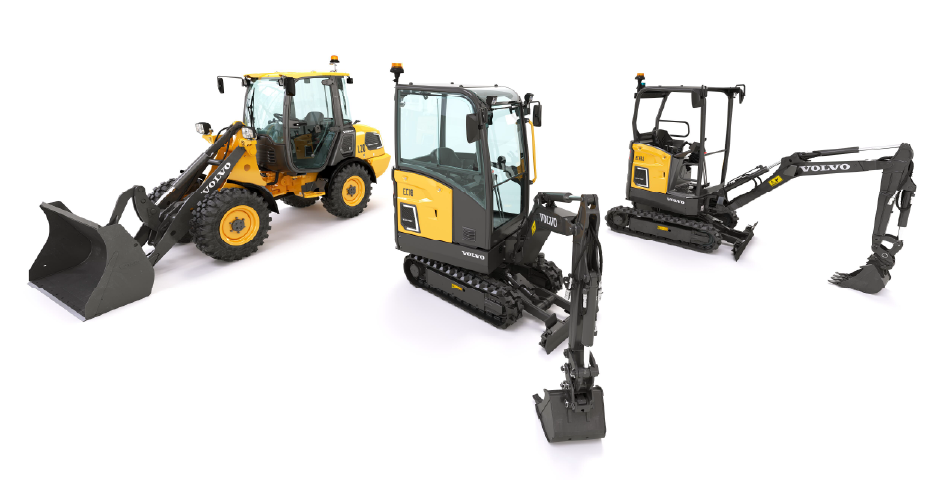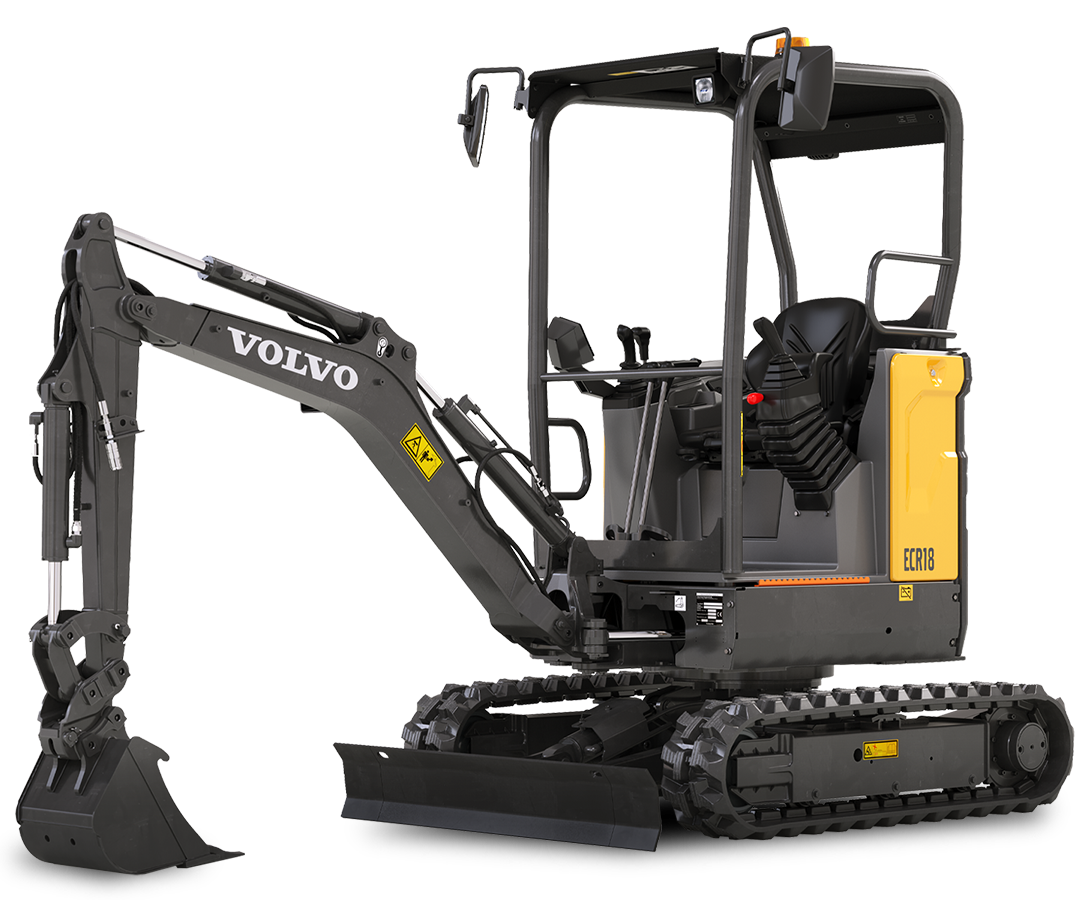


The ECR18 Electric can be recharged in as little as 1 hour. Choose between multiple charging solutions depending on the requirements of your operation. Safe and standard Electric Vehicles (EV) charging protocol.

Work in confined spaces with total confidence thanks to the compact machine dimensions and all-around machine protection. Ultra-short tail swing with an overall minimum width of 995 mm with expendable undercarriage.

Whether working in the machine or on-site, all personnel benefit from the industry-leading low noise levels, absence of exhaust fumes and almost zero vibration and heat.

Step inside the ECR18 Electric for an unrivalled operator experience - from the superior levels of cab comfort through to the outstanding machine performance.
| Operating weight | 1,790 - 1,870 kg |
| Maximum digging depth (short/long arm) | 2,528 - 2,727 mm |
| Maximum dump height (short/long arm) | 2444 - 2588 mm |
| Travel speed, low / high | 1.8 / 3.5 km/h |
| Breakout force | 12.9 kN |
| Tear out force (arm breakout force) (short/long arm) | 7.95 - 6.95 kN |
| Main hydraulic pump max. flow | 34 l/min |
| Electric motor (peak) | 18 kW |
| Overall width | 995 - 1,352 mm |
| Overall length (short/long arm) | 3,431 - 3,309 mm |
| Battery voltage | 48 V |
| Battery capacity | 16 kWh |
| Indicative runtime (depending on application) | Up to 5 hours |
| On board charging time 230 VAC 16A | ~ 5 h |
| Off board charging time 400 VAC 32A | ~ 1 h |
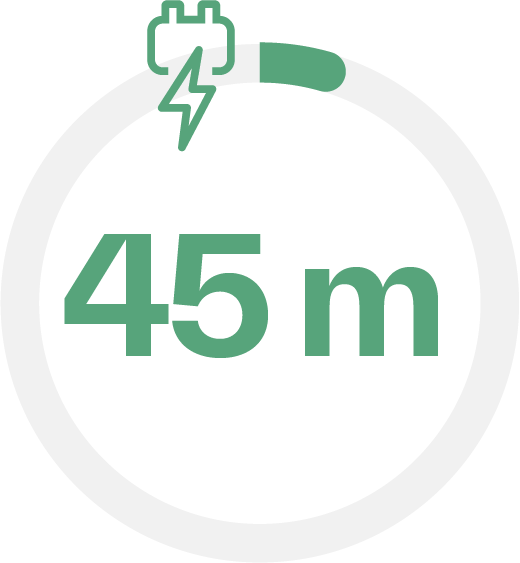
17.3 kW DC (0-80%)
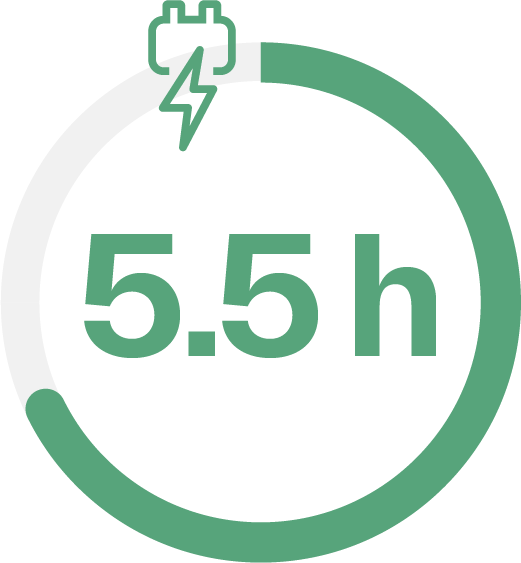
16A AC on-board charging cable (0-100%)
The charging times are an estimate for informative purposes only. Actual values may differ based on power limitations you may have on site. Volvo CE makes no, and expressly disclaims any, representations, express or implied, regarding this website, including the accuracy, completeness, or reliability of the calculations, and other items on this website.

On full charge, based on low workmode.

On full charge, based on low workmode.
Compared to diesel machines, electric machines have the benefit of not consuming energy while idling. If you charge your machine during your normal breaks, you can optimize the capacity of the machine during your workday.
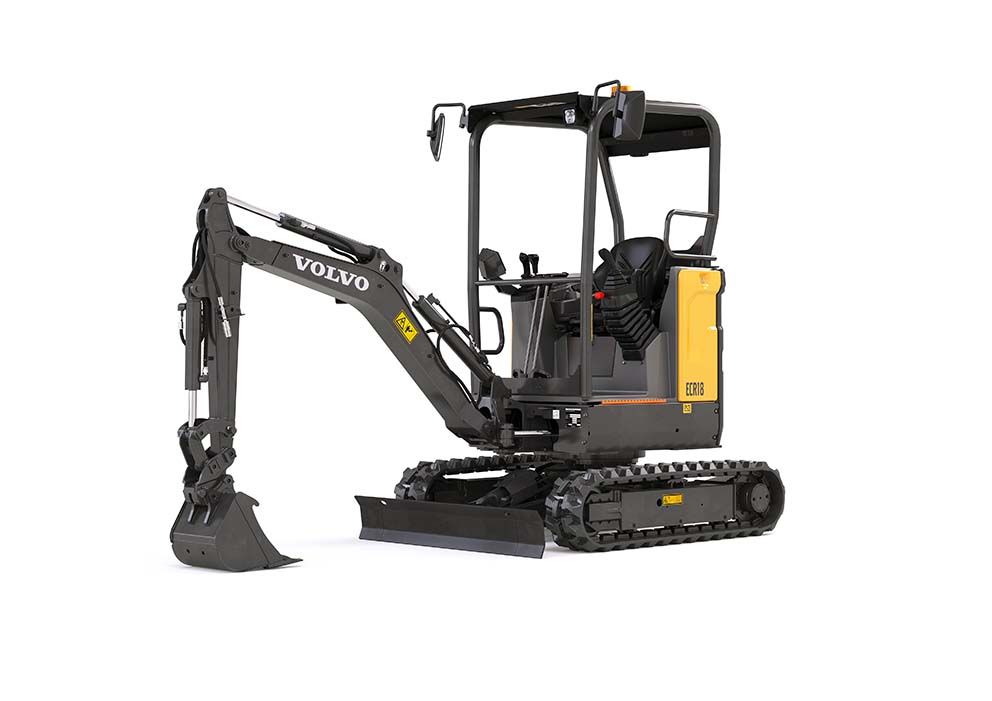 |
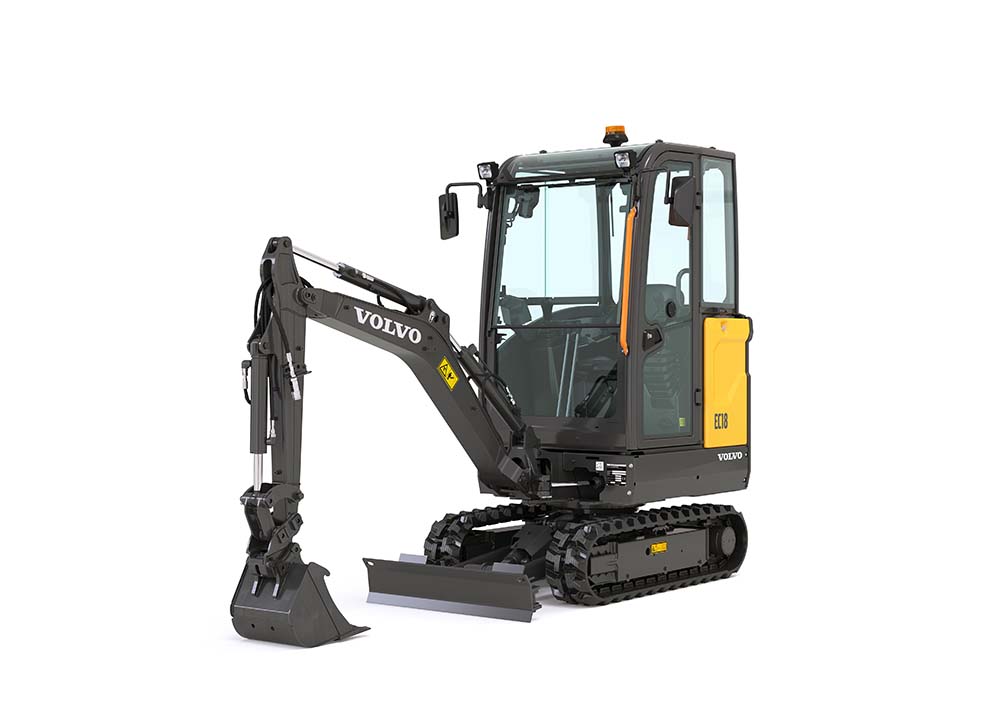 |
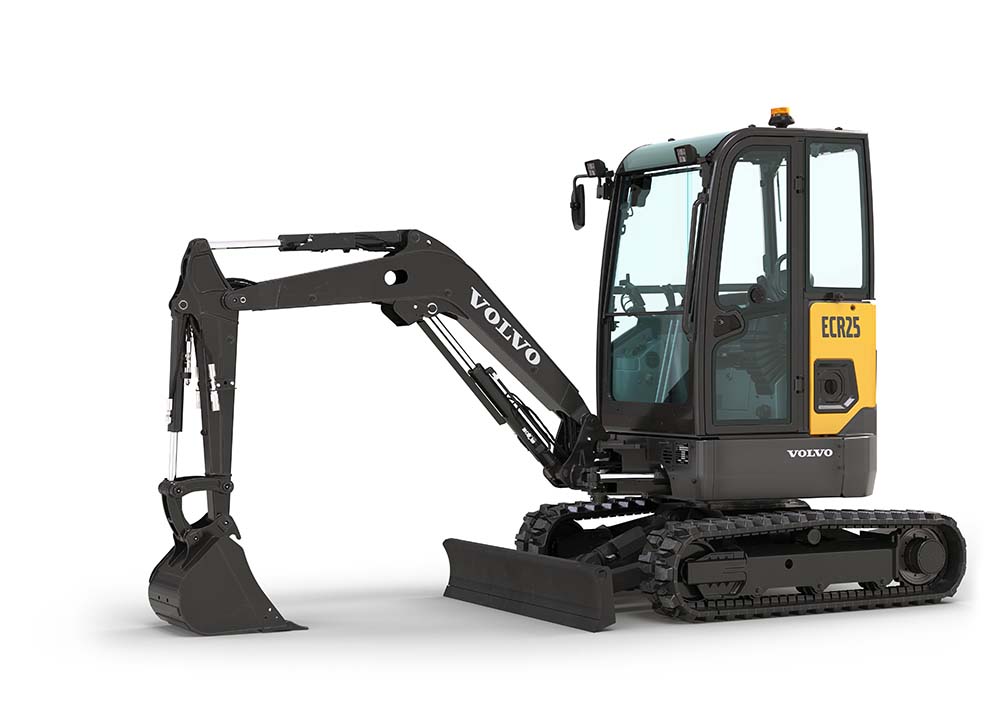 |
|
| Model | ECR18 | EC18 | ECR25 |
| Weight: | 1,790 - 1,870 kg | 1,960 kg | 2,680 - 2,780 kg |
| Max dig depth: | 2,528 - 2,727 mm | 2,500 - 2,700mm | 2,672 - 2,965 mm |
| Overall width: | 995 - 1,352 mm | 995 - 1,352 mm | 1,550 mm |
| Overall length: | 3,431 - 3,309 mm | 3,500 - 3431 mm | 4,008 - 3,876 mm |
| Battery capacity: | 16 kWh | 20 kWh | 20 kWh |
| Battery voltage: | 48 V | 48 V | 48 V |
| View Model | View Model |
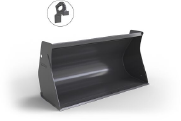
The best choice for all-round efficiency, the General Purpose bucket is suitable for handling and stockpiling already-processed material, in both short cycle and load and carry operations.

The Multi-Purpose bucket can be used as a general-purpose bucket, dozer blade or leveler. A position indicator located on the cylinder gives operators visual guidance on how open the bucket is, helping to accurately distribute material.
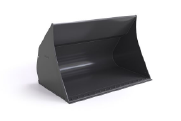
Featuring the best possible visibility and dumping angle, it is tailored to deliver superior performance when loading light and loosely-packed material - such as coal, sugar beets, compost, grain or woodchips.
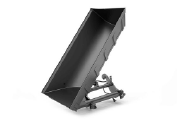
The side tip general purpose bucket is perfect for diverse applications as tunnel construction, building levees, filling trenches.
HB02 Hydraulic breaker. Mechanical quick coupler.
Electromobility means vehicles - including cars, buses, trains, trucks and of course, construction equipment - that are fully or partly driven electrically and have a means of storing energy on board.
Electric machines use an electric motor to propel or perform the main purpose of the machine, whereas a hybrid machine uses more than one power source - usually electric and diesel - and captures and reuses energy that would otherwise be wasted.
Electric vehicles do usually have a reduced environmental impact compared with diesel and gas-powered vehicles. Electric drivelines are generally more energy efficient and emit no exhaust emissions locally where the products are used.
Stricter carbon emission regulations - as well as our customers' own CO2 reduction targets - are certainly pushing this technology forward, but we believe that also desire for greater efficiency and reduced noise are key drivers.
Volvo CE has been researching and developing electric and hybrid technology since as far back as 1998.
So far the amounts of used surplus batteries are fairly low, but as Volvo ramp up their production of electrified machines the need for recycling and reuse streams will increase. To be prepared for this Volvo CE is working together with waste contractors and other actors to maximize the recycling rate of electric batteries. Volvo are also looking into second use possibilities of old batteries to find potentials to prolong the battery lifetime in other applications, e.g. energy storage in facilities.
Yes, Volvo will take care of the recycling of EV batteries. Assuring sustainable management of EV batteries throughout the lifecycle of the product will be an important component in achieving a circular and sustainable transport sector for the future. The producer responsibility regulations that many countries have mandates the battery manufacturers to collect the batteries. Due to considerable values (metal content, etc) of used batteries, there is also a financial driver providing opportunities for partnerships and 3:rd party involvement within the industry. Volvo Group has recently formed the company Volvo Energy who will develop electrification solutions to the group. Battery recycling, recovery and reuse solutions will be developed and managed by Volvo Energy going forward.
To assure that the materials used in the electric batteries in Volvo machines, Volvo CE is assessing all parts to assure that any occurrence of Tantalum, Tungsten, Tellur, Gold and Cobalt come from non-conflict sources. Lithium ion batteries contain certain scarce materials such as e.g. heavy metals and Rare Earth Metals. Some of the scarce materials that can be found in Li-ion batteries and other electromobility components are known to sometimes be derived from sources known to directly or indirectly benefit armed groups in the area of origin. Often these materials are referred to as Conflict Minerals.
Volvo CE's electric equipment offer consists of 5 compact models, Volvo ECR25 Electric, Volvo ECR18 Electric, Volvo EC18 Electric, Volvo L25 Electric, Volvo L20 Electric. Volvo have committed to having 35% of their machine sales be electric by 2030.
All Compact Electric models are supplied with a 2 years/ 2000 hours* comprehensive warranty, using genuine Volvo parts. The battery is covered with a 5 years/ 5000 hours* warranty, using genuine Volvo parts. *Whichever is earlier.
For further details, please contact TDX Ltd.
The electric motor has replaced the diesel engine, but the majority of the hydraulic system in most cases has stayed common to the diesel model base parts with retuning to match the improved performance of the electric drive systems.
Depending on the type of job (application and intensity of the work cycle), with a typical stop-start working pattern, you can operate the machine for up to an 8 hour working day with one single charge.
You can contact your local dealer to calculate the net operating time. The expected operating time is based on your input on how you plan to operate your machine. Have a look at our dealer locator to find your closest dealer and they will help you further.
Depending on the type of job (application and intensity of the work cycle), with a typical stop-start working pattern, you can operate the machine for up to 4 hours with one single charge.
The expected operating time is based on your input on how you plan to operate your machine.
The electric loader recovers energy in all driving conditions while using the brake function of the electric drive system.
The performance of the Volvo electric excavator and electric loader has been successfully tested on ambient temperatures between -10°C and 40°C.
For example: With the optional fast charging device (380V-420V three phase), it takes 1,5 hours for the L25 Electric to charge to a level of 80%.
For example: With the standard charger (220V-240V) which comes along with the machines, the L25 Electric takes 9,5 hours* to charge to a level of 80%.
For example: With the optional fast charging device (380V-420V three phase), it takes less than 1 hour for the ECR25 Electric to charge from 0% to a level of 80%.
For example: With the standard charger (220V-240V) which comes along with the machines, the ECR25 takes 6 hours to charge to a level of 80%*.
When it comes to e-mobility fast charging devices, Volvo currently offers two different fast charger options for the electric product range:
17.3kW Indoor Fast Charger electric battery charger:
High-power fast charger, optimal for increased daily usage, designed for indoor use.
17.3kW Outdoor Fast Charger electric battery charger:
Heavy-duty fast charger for demanding applications and designed for outdoor usage out on the field.
The electric wheel loader and the electric excavator are delivered with an on board charger and the required plugs ( single phase, 10amp and 15amp). With those, the machines can be plugged into a normal household grid to charge the battery. For the optional fast charger of the electric wheel loader battery or the electric excavator battery, a 3 phase supply is needed.
This is one of the major advantages of the electric construction equipment. Electrical components, batteries and motors, are maintenance free.
The batteries used in our electric construction equipment are designed to last the full life expectancy of the machine.
The batteries in our electric construction equipment are designed to maintain a capacity of over 80% beyond the first life of the construction machine.
Yes, the batteries for the new electric excavator and wheel loader range, can be charged at any point in time. The lifetime of lithium ion batteries profits when they are not always fully discharged and recharged.
For example ECR25 Electric and L25 Electric are based on conventional construction equipment design. Only the electric components are new in the vehicles. With its new technology the ECR25 Electric and L25 Electric can deliver similar performance to their diesel versions.
Volvo electric excavators and electric wheel loaders are designed to be used in the same applications as the equivalent diesel machines, like for example demolition, landscaping and utility work.
Furthermore, the electric excavators and electric loaders are even better suited for environments and applications where noise, exhaust emissions or vibrations are a problem today, such as indoor demolition, farming or food processing applications.
In most sites, the lack of engine noise from the electric construction machines is an advantage from a safety perspective as it enables better communication between coworkers on site. Furthermore, a white noise function is offered as an option for Volvo's electric construction equipment, that allows people around the machine to hear without the health issues related to noise.
